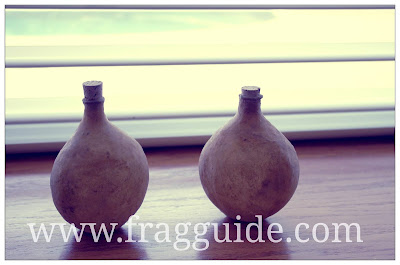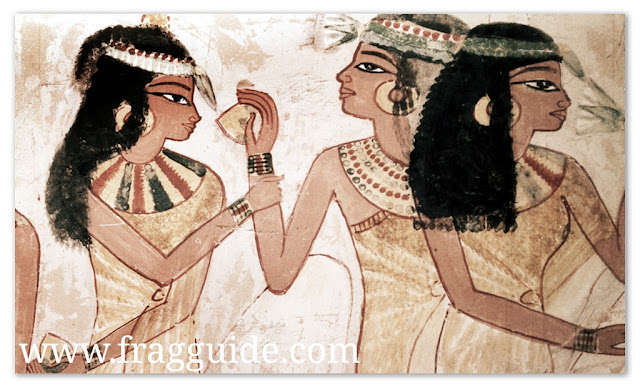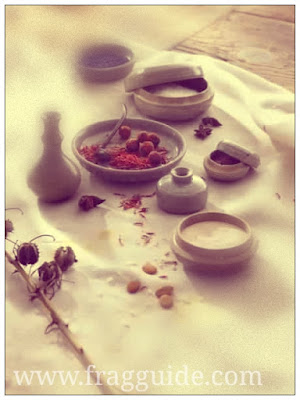The deity of affection, beauty, and desire, Greek deity was conjointly mistress of the sexy arts, fragrance primary among them. Accustomed as we tend to area unit to the aromas of automobile exhaust and cool buildings, to North American country the traditional world would maybe be most irresistible in terms of smell.
Old is Gold | Fragrances from The Past
My personal favorite is a shrub, a deep, vanilla-y scent that's, just like the base notes, tree rosin. It can also be purchased in its raw type, tho' it’s costly that manner. The oil could be a honey-like liquid that may be supplemental to the vegetable oil employing a low stirrer to assemble and so drip it into your fragrance. I conjointly love the sweet rush. the basis of the calamus plant, which may be ground and supplemental, sweet rush incorporates a robust, light, sweet smell, like gold for the nose.
The deity of affection,
beauty, and desire, Greek deity was conjointly mistress of the sexy arts,
fragrance primary among them. Accustomed as we tend to area unit to the aromas
of automobile exhaust and cool buildings, to North American country the
traditional world would maybe be most irresistible in terms of smell. Sweating
men and animals and their waste crammed a city’s streets, creating it important
to line off sacred areas similarly as those of luxury by creating them smell
sweet. The fragrance was all over within the ancient world, from scented oils
accustomed to adorn the body to incense burnt in homes and temples.
Perfumes had several
uses and meanings: they might be holy, employed in the worship of the gods or
the burial of the dead; they might be a logo of standing and superiority, employed
by athletes, aristocrats, politicians, and royalty; they might be healthful,
accustomed relieve ailments of the lungs or skin. In ancient Egypt, Greece, and
across the empire, fragrance was a part of ritual, beauty, and commerce—much
because it is these days.
I investigated this
ancient art to make Spicy Scents, an active activity for Villa guests. Here’s a
primer on however ancient fragrances were created, followed by a DIY tutorial
on the way to build your fragrance, ancient-style. (And here’s the handout from
our program with how-to directions ANd an ingredient list.
A Short History of Ancient Perfumes
I wished to mimic as
closely as potential the manner perfumes would are created within the ancient
world, thus I had to seek out however that worked. Written sources describing
ancient perfuming creating area unit obscure at the best, tho' some writers
like Theophrastus (Greek, c. 270–285 B.C.) in his book On Odors and Pliny the
Elder (Roman, A.D. 23–79) in his explanation embrace lists of ingredients for
perfumes, similarly as some discussion of techniques and tools).
Tablets from Cnossos,
Crete, document oil deliveries to be processed by perfumers, and tablets from
urban center, Thebes, and Pylos mention the work of perfumers. Visual sources
of data were a bit a lot of helpful—the ancient Egyptians delineate fragrance
creating, and wry Roman frescoes from the metropolis and urban center showing
bands of cupids in fragrance retailers mixture scents area unit far-famed. one
in all these is on reading at the Villa in Gallery 207, girls in Antiquity,
wherever we tend to even have several exquisite fragrance containers—a business
in itself within the ancient world.
Archeology provides
richer data, showing that in ancient Egypt, Palestine, and therefore the empire,
temples nearly always had fragrance factories close manufacturing the nice
quantities of fragrances they required. A 2003 anthropology notice at Pyrgos on
Cyprus, the island wherever Greek deity initial stepped foot toward land when
her birth put off, discovered a perfume-making workshop from circa 1850 B.C.,
the oldest one within the world. (The leader of this anthropology dig is giving
a lecture in June here at the Villa).
My initial discovery was
that within the ancient world oils were used because of the carrier medium for
perfumes. In fashionable fragrance creating, AN alcohol is sometimes the
carrier medium, with essential oils supplemental for fragrance combined with
fixatives, coloring agents and preservatives. Alcohols evaporate far more quickly
than oils do, therefore dispersing scent into the air quicker. AN ancient
fragrance would thus be a lot of refined, and you’d got to be nearer to the
skin of the user to feel its intoxicating power.
In the age of Ellas and
Rome, the abundance of vegetable oil created it the foremost widespread oil for
the fragrance business, tho' alternative oils like almond were widespread
similarly. Cheaper oil was higher (and still is) as a result of it's less of
its scent to contend with the sweet materials.
To impart fragrance,
plant-based ingredients were used, as well as flowers, leaves, seeds, woods,
resins, and gums. Animal-derived ingredients were conjointly common, like musk
and civet cat, that area unit the organ oils created by the cervid and
therefore the civet cat, similarly, as an animal product, a weird substance
secreted and infrequently expelled by gamete whales. These aromas tend to be
pungent and even unpleasant in their natural states, however, they act as
fixatives together with alternative scents, accentuating them and creating them
last longer while not transmission their scents to the mixture.
As in past, these days
costlier perfumes still use largely natural products—essential oils gathered
from flowers, spices, and fruits, whereas cheaper one's area unit made up of
synthesized oils that approximate these natural scents.
 |
| old is gold |
The Art of Layering Scents
A fragrance is created
by layering scents in line with however volatile they're, that is, however
simple they evaporate. prime notes evaporate quickly—they area unit the primary
scent you smell during a fragrance. Middle or heart notes type the most body of
a fragrance. Base notes area unit fixatives—they hold and mix the opposite
ingredients, and that they are the skin the longest, thus you usually smell
them together with the opposite aromas of the fragrance.
Animal-derived scents
were the foremost precious base notes of the traditional world, as they still
area unit these days. Natural musk is sort of not possible to come back by
currently, and civet cat and animal product area unit likewise fairly rare,
thus I had to accept a lot of common, however no less authentic base notes for
our perfume-making activity: gum, myrrh, and labdanum. All area unit resins, or
plant sap.
Frankincense and myrrh
are purchased in their raw style of tiny nuggets, that you'll be able to grind
and increase the vegetable oil into that they soften to lend their scent.
Labdanum could be a viscous, sticky tarlike substance in its rosin type. you'll
be able to conjointly purchase the essential oils of any or all of those
substances.
Even as a necessary oil,
labdanum is thick, black, and sticky. to form your fragrance, solely use one in
all the 3 tho', and solely a bit of 1 at that—4 to five nuggets or two to three
drops of the essential oils in two ounces of vegetable oil. These scents area
unit robust and might overpower your final fragrance. For a man’s cologne, you
may opt for 2, or a bit a lot of 1.
For middle notes, we
tend to used some scents that area unit still well-known in fashionable
perfumery: rose, cinnamon, benzoin (more ordinarily called shrub within the
ancient world) and calamus (called by several names by ancient writers, as well
as sweet calamus or sweet rush).
Rose and cinnamon were a favorite combination
for the guts of a fragrance. Rose petals are supplemental on to the vegetable
oil mixture; no over one to three petals tho', or the rose can overwhelm your
final mixture. Cinnamon is supplemental by breaking apart the sticks into tiny
items, or maybe by shaking ground cinnamon into your oil. this mixture makes a
sweet spicy scent, altered this manner or that by the bottom note—atop
frankincense’s piney smell it's a lot of spicy, atop myrrh’s light heat the
rose will shine, and atop labdanum’s pungency, the cinnamon extremely pops.
My personal favorite is a shrub, a deep, vanilla-y scent that's, just like the base notes, tree rosin. It can also be purchased in its raw type, tho' it’s costly that manner. The oil could be a honey-like liquid that may be supplemental to the vegetable oil employing a low stirrer to assemble and so drip it into your fragrance. I conjointly love the sweet rush. the basis of the calamus plant, which may be ground and supplemental, sweet rush incorporates a robust, light, sweet smell, like gold for the nose.
At the perfume-making
workshop, our prime notes were spices you’ll acknowledge from your kitchen:
anise, the seed that offers licorice its distinctive scent; marjoram, the
relative of oregano that the traditional Greeks related to joyous occasions
like weddings; and coriander, the seed of cilantro. we tend to suggest guests
use liberal amounts of those lighter scents so that they wouldn't wander off
underneath the ability of the heartier middle and base notes. Anise and
coriander have to be compelled to be gently ground, whereas marjoram leaves are
supplemental straight to your vegetable oil.
A favorite direction of
the many was myrrh, rose, styrax, and marjoram for heat, sweet fragrance. those
that likable spicier scents would possibly combine gum with cinnamon and a bit
sweet rush, then prime it off with anise and coriander. Brave souls experimented
with combos of sweet and spicy, layering labdanum underneath shrub and
cinnamon, flat-top with marjoram.
Heat, Steep, and Complete
To complete your
fragrance, heat your oil mixture by gushing the oil and alternative materials
into a glass or ceramic dish, heating water during a pot to boiling, turning
the warmth off and sitting the dish with the oil into the water because it
cools. This method attracts the essential oils from the materials and might be
recurrent over once. The mixture ought to then steep for a minimum of
twenty-four hours, at that purpose it is strained—cheesecloth permits you to
wring the oil out whereas keeping all bits of ground materials out of the
ultimate mixture.
I’d like to hear from
our guests United Nations agency did the activity with North American country
at the Villa. however, did your final perfumes flip out? Or if you are
attempting this reception, allow us to understand what the results area unit.
Were they what you expected?
May Greek deity sweeten
your skin with sweet oils so you style a bit of her power!























COMMENTS